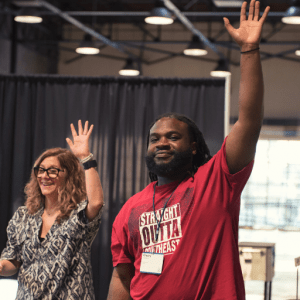
How to Navigate a Once-in-a-Generation Crisis Moment
08/25/2021

Chong-Hao Fu is the Chief Executive Officer of Leading Educators, which “partners with school systems to build and sustain the conditions, teaching, and leadership to ensure that the students furthest from opportunity succeed in school and in life.” A former teacher and founding school leader, Chong-Hao is a leading expert in teacher leadership and professional learning.
As part of The Learning Accelerator‘s Hop, Skip, Leapfrog interviews with subject-matter experts across the K-12 field, Chong-Hao weighed in on education opportunities in a post-pandemic world and key takeaways he hopes will support leaders going forward. Read on for three big ideas from their conversation, in Chong-Hao Fu’s own words.
Takeaway #1: Approach “high-quality” curricula critically by layering in more cultural relevance and context.
“At Leading Educators, we’ve spent the past 18 months creating our open-source Teaching for Equity framework as our north star for great teaching. Thinking critically about what matters most in classrooms means doing some things differently, especially with regards to including more culturally responsive curricula. We’ve stopped using the term ‘high-quality instruction materials’ because the culturally responsive dimension is often missing. We’re continuing to use the terms standards-aligned and grade-level appropriate, as that’s what they are – but they are not necessarily high quality from [the standpoint] that we think [is] important for quality.
At the school level, we’ve seen a lot of energy around efforts to make the curriculum more relevant and culturally responsive, as well. In talking to a principal recently, they described how angry and upset their staff was throughout the nation’s racial reckoning, so we felt like it was really important to channel that into the actual curriculum and ensure our kids would not have as much learning to do about issues of race and identity as current adults. So, we strove to make changes to the curriculum in ways that then tell a more complete picture of our history. They include mindset and cultural directives, and they layer on top of curricula (like Eureka and others) that the schools have already adopted. Their example has been inspiring.
In math, specifically, we see great opportunities for improvement, as well – particularly in mindsets and problem sets. By mindsets, we mean the mathematical and growth mindsets that lead students to be successful, as well as the inclusion of identity work. Illustrative Mathematics, for example, dedicates a significant chunk of their opening units to mindset work, as they’re seeing a growing research base supporting it. We’re curious about the importance of including gender identity, racial identity, and other components of identity, particularly in middle school curriculum. With problem sets, it’s possible to do a lot of this without altering the core curriculum because you can change the real-world context of a word problem. If you can leverage … more of the cultural context the kids are bringing [into] schools, you can have conversations about how kids see themselves in the math.”
Takeaway #2: Assess what worked before snapping back to normal.
“The dominant mindset in education right now is to snap back to normal – following the most challenging and disruptive year of our lifetimes. It understandably feels safer to get back to normal, but there’s an important opportunity to assess what works and identify what educators want to hold onto moving forward. But, what is the process to assess what works, particularly in a year where student data isn’t [very] reliable? How else can you surface the bright spots as a district leader?
At Leading Educators, we’re actually seeing a lot of innovation that has happened – not at the system level, but at the school level. There are times when we’ve talked to [a] system leader and gotten a vague idea of what worked, and then we’ve talked to a rockstar principal and all of a sudden all of the bright spots become clear. Systems are not always aware of all the [excellent] work that’s happening at the school level and how they might take time to assess what’s been working.
People are kind of going back to normal without having assessed whether any of the virtual or asynchronous learning happened with high quality to begin with. If they knew that some [of it] was high quality, then that would give them more comfort, and other opportunities would follow. If they assess and they find it was really effective, they may decide to continue some virtual learning practices that would free up time and capacity for other priorities as well.
One system leader who is assessing effectively is Eric Gordon, Superintendent at Cleveland Metropolitan School District. To prevent Cleveland schools from snapping back to normal, Eric has named summer school as an intentional experiment. Instead of traditional summer school, Cleveland operates a half-day summer school divided into three parts: making up [for] lost instructional time, enrichment-aligned to their portrait of a graduate, and community engagement through community-based research. Eric’s hope is that by making summer school an experiment, he is going to be able to codify new teaching experiences to apply to the school year.
One of the most inspiring lessons we’ve learned in the past year is how leaders have really attended to the values of the moment. We’ve seen principals and district leaders across the country asking what equity means in the context of the pandemic, and what it means to take care of people in the context of private, remote instruction.
Many of my teacher friends have shared how they’ve felt oppressed and demoralized by everything that’s been asked of them this year. Too many teachers were not taken care of, didn’t feel safe, and felt abandoned by their school or district. But then we’ve seen other teachers who have felt the opposite – whose schools have faced the same challenges with a very different set of values. These communities felt like they were rising to meet a once-in-a-generation equity moment. They worked incredibly hard, and they’re also tired, but these teachers feel like they did something incredible for families and kids – something that was worth fighting for, something that they did together.”
Takeaway #3: Strong leaders ground their teams in shared values and make meaning of the work.
“Many of the actions at these two types of schools were similar, but the meaning that leaders were able to make of how the values were lived out in the moment is not something that a lot of people are writing about. It has everything to do with how teachers enter the next year and whether they feel betrayed and abandoned or whether they feel like they succeeded at doing something incredibly hard for the sake of students and families.”
This blog is one in a series describing interviews from TLA’s Hop, Skip, Leapfrog project. Explore more resources.





